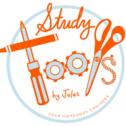(2 min. read)
Kids with ADHD may not enjoy sitting down to read for more than a few minutes at a time. However reading and writing comprise a large portion of their school day. Whether it’s a busy school year or the summertime, we can find ways to “sprinkle in” bits of reading skills practice. We can use media like movies and TV that a kid may already like and use this as a platform for building skills like Vocabulary, Inferring, Context, and Reading Comprehension. Read on to learn how you can do this at home in just minutes a day!
Vocabulary building skills
Kids can learn new words from many places, including when we speak to them. So instead of vocabulary worksheets or online lessons try sprinkling in new words when you are talking to kids. You can also ask them about words from TV and movies.

Helping kids make inferences
Kids are often asked to read at school and make inferences about what they just read – drawing a conclusion or understanding what the author wants you know know without directly saying it. This can be a difficult skill to learn, especially if the reading material is not interesting to the kids. We can use the time spent watching TV and movies with our kids to help them practice the skill of inferring without making it a separate task. It’s blended into the fun you are already having watching TV together.

Explaining context in stories to kids
Context clues can be used to help a reader figure out the meaning of a word. But there is also context in a story that helps paint a picture for the reader. Authors created detailed characters and settings with purpose. A kid with ADHD might be using all of the energy and brainpower to get through reading just the words and not losing their place. Picking up on context is another level of thinking that might not be second-nature just yet. So we can help kids “see” the context in books, movies, and TV shows. The more the kids practice finding and understanding the context the easier it will become to “see” the context all the time.

Building reading comprehension skills
Like I mentioned in the last section kids might use all of the energy and brainpower just to read the words and stay focused on the paragraph or chapter. Once they finish reading the child might not be able to tell you anything about what they read. They were not simultaneously storing the important facts in their mind while they were reading. One strategy we can use is to make the content relatable. How can we relate the story to another book, movie, TV show, or personal experience? If we can make the new story relate to an existing memory or experience the kid could have an easier time understanding and remembering this new information.

Also check out my Learning Resources for free tips on making reading and writing homework less of a struggle for kids with ADHD!
